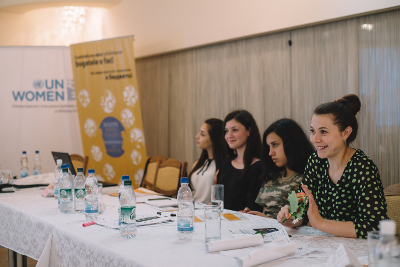Women’s political participation gains momentum in Moldova
Date:
“At university when I presented myself as a Roma, my colleagues’ facial expressions changed. One teacher even asked, why I had come to the university instead of getting married, as Roma girls do,” says Diana Leahu, a 20-year-old Roma woman from Orhei, a city 48 km north of Moldova’s capital Chișinău.

A 2014 UN study indicates that Roma women and girls are among Moldova’s most disempowered groups, often facing inequality in social, economic and political life. Half of the Roma girls in Moldova receive no schooling, only 20 per cent complete primary school, and only 10 per cent graduate from a high school or university.
Leahu is an exception, rather than the norm, in being able to attend and complete university. This summer, Leahu, along with 25 young Roma women and men, attended the week-long Zorjaras summer school, organized by the National Roma Centre and supported by the joint UN Women-UNDP programme, ‘Women in Politics’ (WiP). There she learned about women’s rights and gender equality, her own rights and the importance of issues such as gender-responsive budgeting—how government spending can and should benefit women equally as men—as well as how to engage in politics.
As of 2015, Moldova ranked 64 in terms of women’s representation in the Parliament, with women holding only 22 per cent of seats in the lower house. UN Women-UNDP collaboration with the government and the Parliament contributed towards the adoption of a new law on 14 April, 2016, which for the first time, introduced gender quotas for party list candidates and cabinet nominees. Law No. 71 says that women and men must each make up a minimum of 40 per cent of every political party’s candidates and of cabinet nominees, and amends 15 other national laws. It also introduces 14 days paid paternity leave, prohibits sexist language and images in the media and advertising, and establishes a Gender Equality Coordination Group in the central public administration.
“Adoption of this law is an important step forward towards gender equality in Moldova,” said Ulziisuren Jamsran, UN Women Representative in Moldova. “It is now critical that we join forces and ensure the law is fully implemented and all responsible institutions and the citizens of Moldova are fully aware of its provisions.”
The WiP programme, running from 2014 - 2016 and funded by the Government of Sweden, aims to increase women’s participation in politics and decision-making in Moldova by raising public awareness on women’s contributions to political leadership, the economy and public life, training women to understand and claim their rights and by supporting the government to implement its commitments to women’s rights.

The programme gives particular attention to marginalized women, such as from the Roma communities. Through sustained efforts, for the first time since the Republic of Moldova gained independence in 1991, two Roma women who participated in the trainings and other activities organized by the Romani Women and Girls Network (RWGN) in partnership with UN Women, were elected to town councils in 2015. It wasn’t easy, shared 28-year-old Laura Bosnea from the northern town of Rascani. “Some of the acting political party members declared in public that Romani women had no place in politics.” But drawing upon previous community work, unrelenting efforts, the campaign training skills they had gained and fierce determination, both women were able to overcome the obstacles. “Since I became councillor, 79 Roma children have been registered in schools. Now, the streets inhabited by Roma have lighting and garbage bins have been installed,” adds Bosnea.
To date, the WiP programme has trained nearly 1,000 women candidates and out of these, 98 women—eight mayors and 90 local councilors—have been elected since the interventions. It also helped train nearly 260 elected women local and district councilors. This year the programme is training journalists in gender-sensitive reporting, helping Roma and other under-represented women to develop political skills and networks and organizing forums where Members of the Parliament meet with local community members, particularly women from under-represented groups, to discuss priorities.